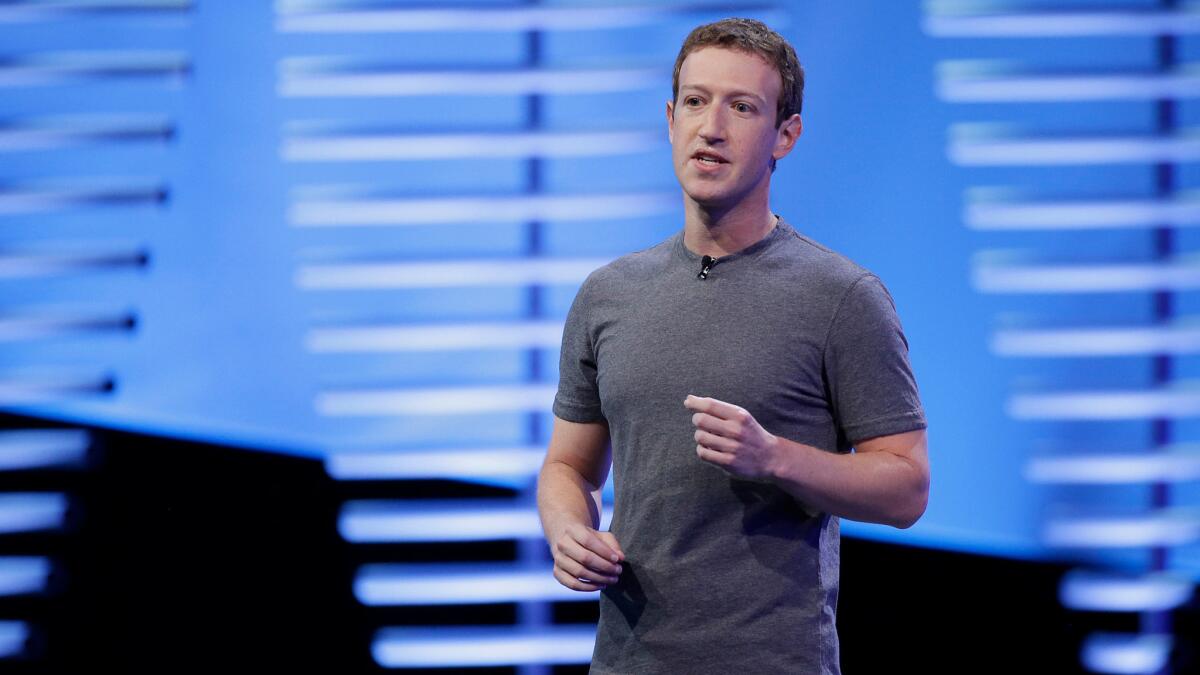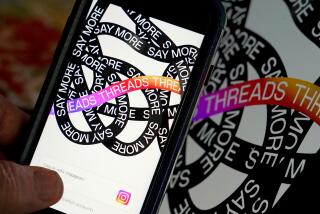If Facebook promotes propaganda, can it be a neutral news platform?

Facebook founder and Chief Executive Mark Zuckerberg pledged two weeks ago to keep his company neutral when it comes to political discussions at home. On Tuesday, he promised the European Union he’d promote propaganda at the behest of Western governments.
So how does neutrality allow for activism?
Facebook and other tech companies say they don’t want to house content that incites the sort of violence and hate that leads to terrorism. The social network along with Twitter, YouTube and Microsoft reached an agreement with the European Union to take down offensive speech within 24 hours. In addition, the companies said their platforms would “encourage counter and alternative narratives” to the inflammatory content promoted by extremist groups.
But with that promise, analysts say tech firms risk blurring the lines for free speech and bolstering government influence on services that have billed themselves as neutral.
How exactly Facebook and the other tech companies plan to promote content that undermines terrorist groups is unclear. Also unclear is what such content looks like. The companies did not respond to a request for interviews.
The agreement poses a potential conflict for the tech firms -- especially Facebook, which is facing questions about whether it’s a neutral platform or an ideologically driven media company. Conservatives last month accused Facebook’s team of news writers of suppressing their viewpoints.
Of course, taking a nonpartisan stance on U.S. politics isn’t the same as ignoring the threat of hate and terror on social media. But it’s unlikely the new counterterrorism initiative will do much to quell neutrality concerns as it “smacks of promoting one kind of thought over another,” said Jan Dawson, an analyst at Jackdaw Research.
“It’s quite another thing to actively promote counter-programming,” he said. “That could run the risk of stoking fears that Facebook and Twitter in particular have particular policy agendas which they will use their platforms to promote. Both companies will have to be very careful to avoid being seen as partisan or favoring one set of acceptable speech over another.”
Silicon Valley has been under growing pressure from authorities worldwide to police its platforms, especially given how terrorist organizations such as Islamic State rely on social networks to recruit. The government has insisted at several meetings over the last year, including with Apple Chief Executive Tim Cook and other industry luminaries, that it needs the tech industry’s help to digitally spar with terrorist organizations that have grown their ranks through social media.
With groups such as Islamic State, governments and social networks face a formidable foe for attention online. With the promise of martyrdom and glory, more than 30,000 foreign fighters have been lured to fight for the militant group.
Though wary of associating too closely with governments, the tech industry has budged. Facebook is sharing data with activists and nonprofit groups about what shape counter-speech should take to give it the best chance of going viral.
But little is known about whether counter-speech or counter-narratives work effectively online -- largely because questions persist about who to target and how.
“A lot of people in the U.S. think a good solution to bad speech is more good speech…. We don’t have much evidence or data to support that idea,” said Susan Benesch of the Berkman Center for Internet & Society at Harvard, who founded the Dangerous Speech Project, which aims to combat inflammatory speech while preserving freedom of expression.
The challenge for tech companies, Benesch said, is determining where the line is for offensive material. Could a news report on U.S. drone policy, for example, be used as a terrorist recruiting tool? If so, should it be downplayed on social networks?
“There’s content, like an academic article, that isn’t produced with hateful intent, but may have the same negative impact as hate speech,” Benesch said.
The EU generally does not protect free speech the same way the U.S. does, but advocates of Internet freedom say the deal could lead to abuse in other countries.
Danny O’Brien, international director of the Electronic Frontier Foundation, said he was “deeply disappointed” with the agreement, which mends some of the troubles U.S. tech firms have faced for years in Europe over privacy concerns and protectionism.
The EU has “rubber stamped the widespread removal of allegedly illegal content, based only on flagging by third parties,” O’Brien said. “It does not address that different speech is deemed illegal in different jurisdictions, nor how such ‘voluntary agreements’ between the private sector and state might be imitated or misused outside Europe.”
EU officials said security threats necessitated Tuesday’s agreement.
“The recent terror attacks have reminded us of the urgent need to address illegal online hate speech,” Vera Jourova, the EU commissioner responsible for justice, consumers and gender equality, said in a prepared statement. “Social media is unfortunately one of the tools that terrorist groups use to radicalize young people and racists use to spread violence and hatred. This agreement is an important step forward to ensure that the Internet remains a place of free and democratic expression, where European values and laws are respected.”
The tech companies say they can balance the policing of hate speech with freedom of speech.
“We remain committed to letting the tweets flow,” Karen White, Twitter’s European head of public policy, said in a prepared statement. “However, there is a clear distinction between freedom of expression and conduct that incites violence and hate.”
Facebook remains encouraged by the possibility that speech countering extremist groups can weaken the pull of terrorists.
Removing content “is not the way that we fix this problem,” Facebook’s head of global policy management, Monika Bickert, said during an address at the Washington Institute for Near East Policy that was shared on YouTube. Getting people to challenge terrorists’ messages is “actually accomplished through more speech -- speech that encourages people to actually take a hard look at these groups and what they stand for and question it.”
Earlier this year, Facebook Chief Operating Officer Sheryl Sandberg said sharing stories about people who defected from Islamic State after being lured to the Middle East would be the “best thing to speak against recruitment by ISIS.”
The company also has backed an Obama administration program called Peer 2 Peer, encouraging millennials to come up with anti-Islamic State messages.
One of the organizers of the program, an education consulting firm called Edventure Partners, said Peer 2 Peer has helped troubled youths across the world while accumulating tens of thousands of likes and followers online.
“We believe youth is able to better reach and impact their peers than traditional approaches,” said Tony Sgro, chief executive of Edventure Partners. “Government and adults have proven they can’t do it and are ineffective in creating alternative and counter narratives. Who better to push back on extremism than the very same audience extremists want to recruit?”
Twitter: @dhpierson
Twitter: @peard33
More to Read
Inside the business of entertainment
The Wide Shot brings you news, analysis and insights on everything from streaming wars to production — and what it all means for the future.
You may occasionally receive promotional content from the Los Angeles Times.












